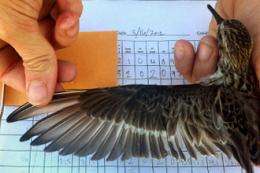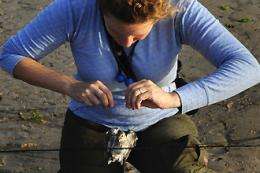Migratory birds may reveal further impact of oil spill

(Phys.org) -- The full impact of the 2010 Deepwater Horizon oil spill has yet to reveal itself, say researchers in the Tulane Department of Ecology and Evolutionary Biology. The largest-ever accidental release of oil into marine waters could impact earth’s ecosystems for years to come — and not just along the 650 miles of the northern Gulf of Mexico coastline directly affected by the spill.
“More than one million migratory shorebirds representing 28 species were potentially exposed to Deepwater Horizon oil during their 2010-2011 nonbreeding season,” says Caz Taylor, assistant professor and a population ecologist. “Although only 8.6 percent of the shorebirds trapped from fall 2010 to spring 2011 showed visible signs of oiling, nonlethal effects and degradation of habitat can affect populations in ways that carry over into subsequent seasons.”
Nonlethal effects on birds could include diminished health, diminished plumage quality, prey and habitat switching, delayed migration and more.

All of these setbacks can lead to reduced productivity in breeding shorebirds, which in turn impacts food chains in places far and wide. In a study published in the July 2012 issue of the journal BioScience, Taylor and her team call for other researchers to explore the potential consequences of the oil spill in ecosystems where migratory shorebirds breed, such as the Canada Prairies, the Great Plains, the Great Lakes and even the Arctic.
“As our knowledge of migratory connectivity grows, so does our understanding that ecosystem dynamics are not driven entirely by local events but, through migratory animals, can be influenced by events taking place in distant locations,” explains Tulane graduate student Jessica Henkel, the lead author of the paper.
“Migratory shorebirds provide a system for evaluating the direct and indirect effects of an oil spill on affected habitats and the potential for carryover effects to other ecosystems.”
Provided by Tulane University

















